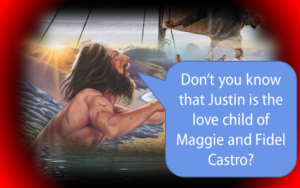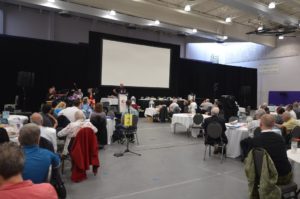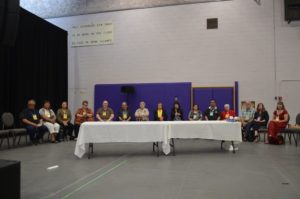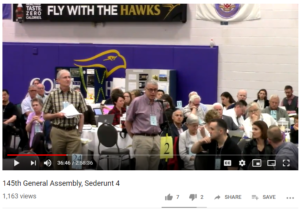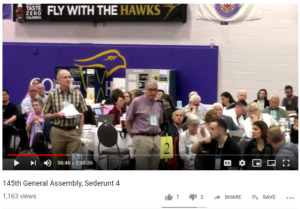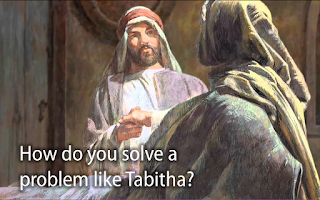Hespeler, 30 June, 2019 © Scott McAndless
1 Kings 19:15-16, 19-21, Psalm 16:1-11, Galatians 5:1, 13-25, Luke 9:51-62
| T |
omorrow you and I will get up and, each in our own way, celebrate something wonderful. We will celebrate the wonderful country in which we live. We will celebrate Canada’s beauty and its people and their accomplishments. We will celebrate our heritage and history as well we should. But one thing in particular that I and many others will celebrate this year is a document, called the Canadian Charter of Rights and Freedoms that grants and symbolizes the freedoms that I enjoy as a Canadian: freedom of religion, of thought, of expression, of the press and of peaceful assembly, freedom to participate in our political system, freedom of movement and the right to life, liberty and security.
I don’t know about you but, in the world where we seem to find ourselves today where leaders refuse to leave office, electoral systems are hacked and oppressive regimes tighten the screws, it is good to know that my freedoms are guaranteed. So, we’ve got these freedoms and that is good, but I sometimes wonder if we really understand these freedoms or even if we know what freedom actually is.
There are certainly some expressions of freedom today that I have got to say are somewhat disturbing. Yes, we do have freedom of speech, for example, and I celebrate that, but I am often appalled by those who use that freedom to spread false information on the internet – especially false information that seeks to destroy the democratic institutions that guarantee that freedom of speech. I am distressed by those who use their freedom of speech to spread hatred of particular groups.
But I’m almost equally disturbed by the ways in which people fail to exercise the freedoms that they’ve been given. How is it that so many fail to apply critical thinking to the free speech that they read on the internet? How is it that, when we have such a wonderful freedom to choose our political leaders, that so many people fail to vote or to engage in the electoral process in any meaningful way? And how is it that we collectively seem to be incapable of thinking of anything beyond short-term needs in order to consider the long-term needs of our country?
In fact, the more I think of it, the more it seems to me that, while we like to talk a lot about freedom, we don’t really have a good idea of how to live with the freedoms that we’ve been given. Interestingly enough, that is exactly the issue that the Apostle Paul seems to be addressing in our reading this morning from his letter to the Galatians.
Paul writes this to the churches in Galatia, “For freedom Christ has set us free. Stand firm, therefore, and do not submit again to a yoke of slavery.” For Paul, you see, one of the most important things that being a follower of Jesus gave you was freedom. This is something that wouldn’t have been entirely obvious to most observers at that time and place. The church in Galatia, and indeed the church in most places at that time, was not particularly made up of wealthy and important people but instead of those who were considered the dregs of society. Many of them, in fact, would have been slaves. They literally lived their lives with no freedom over their own bodies or what they did with them and most lived without any hope of ever being emancipated.
And yet Paul is saying to these very people and people like them that Jesus has set them free. They have had no experience at all of freedom and, in fact, almost nobody around them, except maybe their Christian brothers and sisters, see them as free. And so, Paul seeks to instruct them about how to live out this brand-new thing to them that is called freedom.
We are in a rather different situation. We enjoy tremendous freedoms, freedoms like few in the history of the world have had, and yet we often seem to take those freedoms for granted. We are so used to them that maybe we have almost forgotten how they ought to be lived out. So I think that maybe Paul’s advice to those Christians in Galatia who were dealing with their first experience of freedom and didn’t know what to do with it might also be helpful to us today who are so used to it that we may have forgotten what to do with it.
“For you were called to freedom, brothers and sisters;” Paul admonishes the Galatians, “only do not use your freedom as an opportunity for self-indulgence.” He is pointing out two dangers that come with freedom. One is that we do not live out that freedom and the other is that we fall into a kind of slavery of self-indulgence.
To give you a sense of what I think he is trying to say, let me give you an illustration from something that we sometimes see going on here at St. Andrew’s. We run a ministry here, as you know, called Hope Clothing. The mandate is simple. We give out clothes to people who need them, free of charge. It is, in other words, an exercise in freedom – not the same kind of freedom that we enjoy in a democracy, of course, but there are similarities in how people respond to that freedom.
For example, the vast majority of people who come into the Hope Clothing use that freedom in the way that it is intended. They come in and they take what they need, as much as they need and when they need it. But there are some who struggle with that freedom. There are some who really struggle to receive what they need. Even though, in most cases, people may find themselves in a position where they simply don’t have the resources to provide what they need for their family at that moment for reasons that are entirely beyond their control, they feel shame and so they cannot take what they need. We have had cases where a family has suffered a disaster like a fire, and we have seen the community of Hespeler rally around that family by giving generously. People want nothing more than that this family take everything that they can possibly use. But then the family comes in and they take the absolute minimum because they don’t know how to receive. For such a family, even though the clothes are provided freely, they cannot receive them in freedom and so they do not experience true freedom.
And I think that there are many of us who have the same trouble receiving the freedom that God has given us or that our democratic system has given us. Perhaps it is because of inappropriate shame or guilt, perhaps it is simply because, somewhere deep down inside, we have not been able to believe that we can deserve such freedom, but for whatever reason, we simply fail to receive the freedom that we have been given. And, if you do not exercise your freedom, you are not truly free, just like the clothes at Hope Clothing are not free to those who are incapable of receiving them.
So that is one problem with freedom that a few people have when they come into Hope Clothing. There is another problem that a few have. We’ve known some who come into Hope Clothing and can’t handle the freedom of it but what they do is the opposite – they take what they don’t need – often as much as they can possibly get away with. Now such people might seem, on the surface, to have a perfect grasp of the meaning of the word free, but they don’t really. These people, you see, are hoarders. They have a compulsive need to store up things and possessions that they don’t need. It is a compulsion that likely stems from a deep insecurity, an inner dis-ease that doesn’t feel so bad when they have a lot of stuff piled up around them.
So, when people behave like that, do they really understand the freedom with which the clothes are offered to them? No, they do not. Actually, they experience the opposite. They experience slavery – they are slaves to their possessions that often begin to take on such a big role in their lives that they dominate everything. They become trapped by the “free” things that they have received. So, this is something that we have rarely had to deal with at Hope Clothing. And I strongly believe that it is not something that you deal with simply by imposing rules and limits on people. Instead it is about ministering to the whole person and helping them to come to understand the true grace of receiving; we have seen some success with that.
In his Letter to the Galatians, Paul speaks about the same problem that he sees people having with the freedom that they have found in Christ. He speaks of those who use their freedom “as an opportunity for self-indulgence.” It is the same reaction, where people become so overwhelmed by not being constrained by rules and the need to follow laws in order to be acceptable, that they begin to spend their life in all manner of self-indulgence.
Indulgence, in itself, is not necessarily a problem. There is nothing wrong and much that is right in treating yourself well – enjoying good food, good drink, good companionship and more. You need to be able to enjoy these kinds of things in order to know that you are free. But those who have deep underlying insecurities and maybe don’t really believe that they are really free to enjoy these things, can fall into the trap of a self-indulgence that leads to slavery – precisely what Paul is warning about when he says, “Stand firm, therefore, and do not submit again to a yoke of slavery.” When you are the master of your appetites and desires, you are free and should enjoy that freedom to the maximum. But when your appetites control you, you have a problem and may find that you are no longer free.
Paul is speaking about the freedoms that we have because we are accepted by God, not because of what we do but because of what Christ has done for us. What he tells us is something that we should certainly keep in mind as we practice that freedom today. But, as we prepare to celebrate Canada Day and the freedoms that our country gives us tomorrow, I think we should also take and apply Paul’s lessons to how we live out those freedoms as well. First of all, we are not truly free as Canadians if we do not receive and use the freedoms we are given. If we do not vote or intelligently engage in the electoral process, we no longer have the freedom to determine our leaders. We are called to freedom and so we must live in it.
But the other part of what Paul says about freedom in Christ also applies to our Canadian freedoms. Freedom that is nothing more than self-indulgence is no freedom and will lead to a kind of slavery. I think that we see that in those who use their freedoms as Canadians – their freedom of speech for example – to indulge in hatred and abuse of others. They can do it (I mean, yes, certain kinds of hate speech are illegal, but you can still get away with saying a lot of bad and hurtful things) but that does not lead to more freedom for yourself or anyone. In the worst cases, it leads to more division and ultimately a loss of freedom.
Freedom is a wonderful gift. It is a gift of God given in the name of Jesus Christ. It is gift of democratic constitutions. But it is not a gift to be squandered but rather to be used by those who are able to master their own desires. That is what will protect the gifts of freedom over the long term. And I believe that that is what God desires for us and for our country. As someone wisely wrote, “God keep our land glorious and free.”


